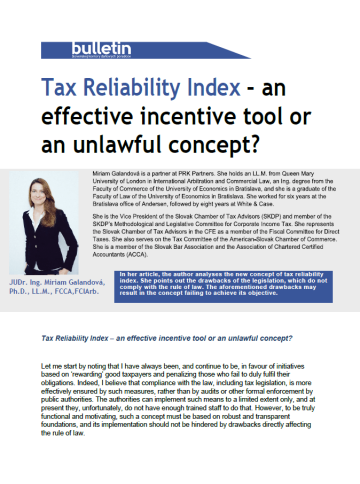Tax Reliability Index – an effective incentive tool or an unlawful concept?
In her article, Miriam Galandova, the author analyses the new concept of tax reliability index. She points out the drawbacks of the legislation, which do not comply with the rule of law. The aforementioned drawbacks may result in the concept failing to achieve its objective.
Let me start by noting that I have always been, and continue to be, in favour of initiatives based on ‘rewarding’ good taxpayers and penalizing those who fail to duly fulfil their obligations. Indeed, I believe that compliance with the law, including tax legislation, is more effectively ensured by such measures, rather than by audits or other formal enforcement by public authorities. The authorities can implement such means to a limited extent only, and at present they, unfortunately, do not have enough trained staff to do that. However, to be truly functional and motivating, such a concept must be based on robust and transparent foundations, and its implementation should not be hindered by drawbacks directly affecting the rule of law.
The Constitutional Court of the Slovak Republic states that ”the sphere of taxes (or fees) belongs to the group of ’political issues’, where a higher degree of autonomy of the legislator shall be observed”1, but this autonomy is not limitless. “Referring to the provisions of tax laws, a constitutionally acceptable interference with the fundamental right to conduct business may be considered an interference which:
- is carried out in compliance with the principle of legality;
- pursues a legitimate aim and has a rational basis;
- does not impose a demonstrably disproportionate burden on business and is not extremely disproportionate to the relevant public interest;
- does not constitute a manifest or arbitrary breach of the constitutional principle of equality, including in conjunction with the protection of the fundamental rights of entrepreneurs.“2
I outline below why, in my opinion, these principles were not observed when passing tax reliability index legislation.
The full article was published in the journal for the professional public and science bulletin Slovenskej komory daňových poradcov.
Miriam Galandova
1) Judgment of the Constitutional Court of the Slovak Republic PL. ÚS 9/2014-63, p. 16
2. Judgment of the Constitutional Court of the Slovak Republic PL. ÚS 14/2014-72, par. 77




